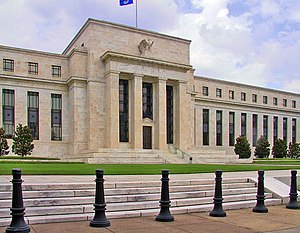Tyler Durden
In a phenomenal demonstration of frankness and true economic assessment, the head of the China Investment Council, Lou Jiwei, who controls China's $298 billion sovereign wealth fund, admits the ponzi nature of today's markets:
Both China and America are addressing bubbles by creating more bubbles and we're just taking advantage of that. So we can't lose.
Indeed, they can't lose thanks to the criminal silence on behalf of Mr. Jiwei's US financial counterparties. It doesn't get any simpler than that folks. Keep in mind Madoff was thrown in jail for a few hundred years for much less: what's $55 billion when you are dealing with a $20 trillion+ global equity market Ponzi scheme. And yet both China and the US continue their struggle to perpetuate a Ponzi, with the full implicit backing of all financial, regulatory and legal authorities. The system is now officially broken, even ignoring the conspiratorial ramblings of fringe bloggers.
And as for who, aside from TradeBot and HAL9000 are speculating in equity markets, look no further than China, which is dead set on exporting its tulip mania to US stock markets:
![Reblog this post [with Zemanta]](http://img.zemanta.com/reblog_a.png?x-id=a19bd733-827c-45a2-8f0d-75d15da88b2a)
![Reblog this post [with Zemanta]](http://img.zemanta.com/reblog_a.png?x-id=4f08340e-921e-431a-8f33-09dbf18876ef)

![Reblog this post [with Zemanta]](http://img.zemanta.com/reblog_a.png?x-id=34443b92-2fc9-4617-b9ce-f5165210f0b9)
![Reblog this post [with Zemanta]](http://img.zemanta.com/reblog_a.png?x-id=9e8f174b-196a-45cc-a896-9691f0d1c7ff)

![Reblog this post [with Zemanta]](http://img.zemanta.com/reblog_a.png?x-id=d8ee7f03-b9be-47e4-bb8f-dbc22857bc33)

![Reblog this post [with Zemanta]](http://img.zemanta.com/reblog_a.png?x-id=b58645f4-2c96-491c-9b7e-64267077cedd)
 We previously stated that gold ownership was made illegal on 1st May 1933. What we did not tell you and we correct now, was that U.S. citizens, under Order 6102, were to own up to $100 in gold coin [±5 ounces]. Today that would be worth under $5,000 a mere token gesture to real gold owners. It acted as a tiny 'escape valve' to the general body of citizens and did not detract from the fact that effective gold ownership was abolished. So that we fully understand the attitude of governments to gold [which remains real money in times of crisis] we add this paragraph: -
We previously stated that gold ownership was made illegal on 1st May 1933. What we did not tell you and we correct now, was that U.S. citizens, under Order 6102, were to own up to $100 in gold coin [±5 ounces]. Today that would be worth under $5,000 a mere token gesture to real gold owners. It acted as a tiny 'escape valve' to the general body of citizens and did not detract from the fact that effective gold ownership was abolished. So that we fully understand the attitude of governments to gold [which remains real money in times of crisis] we add this paragraph: -
![Reblog this post [with Zemanta]](http://img.zemanta.com/reblog_a.png?x-id=428a447a-f506-4a4a-8832-5fff716c80dc)
![Reblog this post [with Zemanta]](http://img.zemanta.com/reblog_a.png?x-id=6d10b682-da53-4fa4-85de-a27b64ac6794)


![Reblog this post [with Zemanta]](http://img.zemanta.com/reblog_a.png?x-id=1d7e8d3f-28e3-4c96-8e0b-05caf12ff064)
 Video
Video ![Reblog this post [with Zemanta]](http://img.zemanta.com/reblog_a.png?x-id=6c2f8796-806f-4ebc-aff3-78ea2f7414cd)

![Reblog this post [with Zemanta]](http://img.zemanta.com/reblog_a.png?x-id=a1a60bf9-9635-4db2-9235-d9796e4f21f2)

![Reblog this post [with Zemanta]](http://img.zemanta.com/reblog_a.png?x-id=75e22b8a-69a4-4ba7-870a-84eb960551fa)
![Reblog this post [with Zemanta]](http://img.zemanta.com/reblog_a.png?x-id=dd5d4929-e02c-43bf-848c-ece23f036010)

![Reblog this post [with Zemanta]](http://img.zemanta.com/reblog_a.png?x-id=5a334b8f-4f1b-4d95-b106-037bdfcc3829)
![Reblog this post [with Zemanta]](http://img.zemanta.com/reblog_a.png?x-id=27741b5d-8028-4c37-9947-ee20f395c409)

![Reblog this post [with Zemanta]](http://img.zemanta.com/reblog_a.png?x-id=9a788942-40a3-425c-bcb3-9d1c6cfe6079)
![Reblog this post [with Zemanta]](http://img.zemanta.com/reblog_a.png?x-id=8106befe-0a66-4ac4-b477-889c77bc3166)

![Reblog this post [with Zemanta]](http://img.zemanta.com/reblog_a.png?x-id=b9c3e2f5-d3ec-4dc0-81c4-5d11dfeea509)

![Reblog this post [with Zemanta]](http://img.zemanta.com/reblog_a.png?x-id=f9385054-4f92-4149-bd18-b9d5a890f296)

![Reblog this post [with Zemanta]](http://img.zemanta.com/reblog_a.png?x-id=7300b288-2b04-4dbd-a997-c1527b40d2c9)
![Reblog this post [with Zemanta]](http://img.zemanta.com/reblog_a.png?x-id=ce2a9c68-b6fa-488a-9ec7-980b6b947ade)
![Reblog this post [with Zemanta]](http://img.zemanta.com/reblog_a.png?x-id=d6e58435-c997-4b3f-b303-fd4bd8f38464)

![Reblog this post [with Zemanta]](http://img.zemanta.com/reblog_a.png?x-id=f37d3842-eefb-48fa-8713-6d71869a3d21)

![Reblog this post [with Zemanta]](http://img.zemanta.com/reblog_a.png?x-id=4f22c4df-5c85-4bf6-a6e8-cdf34e642ffc)

![Reblog this post [with Zemanta]](http://img.zemanta.com/reblog_a.png?x-id=2044bab0-5825-4637-9654-179e0ad0c054)

![Reblog this post [with Zemanta]](http://img.zemanta.com/reblog_a.png?x-id=85565a6e-9d61-41c0-9ef4-c1e835e83c6a)

![Reblog this post [with Zemanta]](http://img.zemanta.com/reblog_a.png?x-id=219892a8-8fdf-458f-800a-5f97ef1a23ee)
![Reblog this post [with Zemanta]](http://img.zemanta.com/reblog_a.png?x-id=5fca4534-b4d0-4537-ac8c-404eaaf01802)

![Reblog this post [with Zemanta]](http://img.zemanta.com/reblog_a.png?x-id=3476ff2c-0509-4222-9355-15109bf09124)